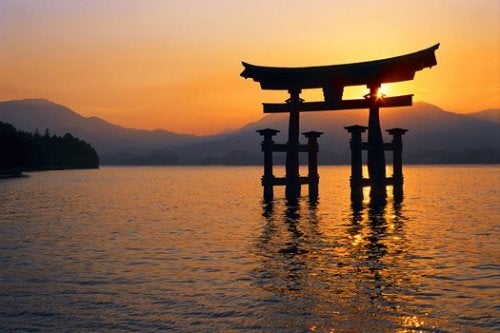The origin of death according to Japanese mythology is found in a curious legend about the creation of Japan. Despite the influence of ancient Chinese civilization, a very important part of Japanese religion and mythology is unique. In addition, they contain Sintoists and Buddhist traditions, as well as popular agricultural beliefs.
Conventional Japanese myths are based on Kojiki and Nihon Shoki. Does Kojiki literally mean? And it is considered the oldest book on the myths, legends and history of Japan. Nihon Shoki is the second oldest and tells several acts of the gods.
We will see below what is the origin of death according to Japanese mythology, through a wonderful legend.
“So we can get to what we’re going to lose anyway?Isabel Allende-
In the early days, the first Japanese gods created two divine beings, a man named Izanigi and a woman, Izanami, these ancestral gods were tasked with creating a land so wonderful that it could not be compared to any other.
Years later, when they fulfilled the mission imposed by the first gods, they decided it was time to have children, and from the union of these two deities the eight great Japanese islands were born.
Harmony reigned in the created world. The deities lived happily with their children until one day Izanami conceived Kagutsuchi, the god of fire. After a very complicated birth, the mother spent some time very ill until she finally died.
The suffering of the death of the deity was so devastating that Izanigi was not satisfied and, after burying his body on the mountain, on the mythical Mount Hiba, near Izumo, he decided to go in search of his beloved in the kingdom of Yomi. the name that receives the land of the dead.
Izanigi went to the land of darkness and began the search for his beloved wife, all the demons he met warned him that Izanami could never accompany him, that it was impossible to return to the land of the living after meeting Yomi.
After several months of hardship and suffering, Izanigi finally found his wife in a dark place and she told him that he could not go home with him because it was too late, because he had eaten food in the underground world. She tried to convince Yomi’s leaders to let her go and asked her husband not to come in during that time.
The only condition for the approval of the gods was that Izanigi did not look at his wife when he returned to the palace, but the deity, as in the myth of Orpheus, did not resist temptation, ignited a small flame and entered the palace. With the light, Izanigi violated the law to disturb the harmony of darkness and contemplated the body of his wife turned into a decaying corpse, full of worms; from his head and chest emerged the deities of thunder and lightning.
Thus, the god fled in terror as his wife accused him of covering her with shame and driving him through the kingdom of Yomi to kill him. After a relentless pursuit, Izanami dumped her husband’s body, leaving him seriously injured.
The father of creation ran restless until he felt the breeze from the outside that, despite his wound, managed to reach the kingdom of the living and, with the little strength left, sealed the narrow opening that separated the two worlds with a large rock.
From inside the cave, Izanami yelled at her husband to let her into the realm of the living, but he, terrified of everything that happened, vehemently refused. Therefore, the goddess threatened her wife with killing 1,000 humans a day, to which Izanigi replied “so I will give life to another 1,500 beings a day. “
Thus death began to spread across the Earth and the celebration of Japanese Day of the Dead, or Obon, began more than 500 years ago.
The origin of death according to Japanese mythology remains part of an ancient past in which myths and religion are part of the general thought of ancestral culture.
Today, in Japan, there has been a deterioration of the sense of community, family and death, giving way to a more Westernized thought, death is considered to be covered with a certain filth that must be purified and, therefore, it is necessary to cleanse, season, dress and prepare with the most dignified appearance the person who is dead and whose soul goes to the world beyond.
In conclusion, and unlike Western culture, in which this process is treated as taboo, death, according to Japanese mythology, is considered inevitable, with actions taken in life important. comforting feeling when we consider that the person’s soul remains with us.
“Forever, it’s a long time, do I think we’ll end up in better circumstances or in other lives?. – Miyamoto Musashi-

